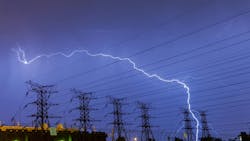EPRI's Climate READi Framework: Building Resilience in the Power Sector
As society’s reliance on electricity continues to grow, the power sector is assessing its current and future resilience against weather and climate-related hazards to ensure the reliable delivery of power to customers.
To assist the power sector in managing physical climate risks and developing adaptation strategies, EPRI launched the Climate Resilience and Adaptation Initiative (Climate READi) in April 2022. The Climate READi Framework, launched in May 2025, is the product of three years of collaboration and offers resources that support proactive and integrated planning for an evolving energy system and climate.
Introducing EPRI’s Climate READi Framework
The Climate READi Framework is a structured, data-driven, science-based approach to physical climate risk assessment and adaptation planning. It provides guidance and methods that companies can use to assess the impact of climate hazards on their assets and systems, and identify and prioritize adaptations that enhance resilience. Over the past three years, EPRI has collaborated with more than 40 electric companies and over 100 academic, consulting, financial institutions, national labs, regulators, and government agencies to develop this framework.
The framework encompasses a set of guidance, references, and tools that power system practitioners and industry stakeholders can use to assess risks to their assets and systems from physical climate conditions.
To facilitate access to Climate READi resources, EPRI developed the Climate READi Compass: Navigating Physical Climate Risk Assessments for the Power System, which provides a starting point for navigating the framework, including its 60+ deliverables. This centralized resource aims to help power companies throughout the various stages of the physical climate risk assessment process, helping practitioners determine which elements of the framework are best suited to their implementation needs.
Who Can Benefit from the Climate READi Framework?
The framework is designed for a variety of stakeholders within and adjacent to the electric power sector. Its application may vary by organization, and the framework provides technical guidance to help organizations tailor assessments accordingly.
- Power companies can use the framework to evaluate their resilience to physical climate risks and develop adaptation strategies. The company's assessment activities will vary depending on the company’s corporate structure, existing planning processes, regulatory requirements, asset portfolio, and market participation. Additionally, Climate READi resources can support power companies in analyzing and justifying potential climate resilience strategies.
- Regulators can use the framework to understand the full process for assessing physical climate risk and justifying climate resilience-related investments. The framework can also help regulators understand what information can be provided from a physical climate risk assessment and help them structure regulatory guidance in a way that is informed by science.
- Investors may be interested in understanding power companies’ efforts to address potential physical climate risks to their assets and systems. The framework helps investors understand what information can be provided from a physical climate risk assessment.
- Consulting firms can support power companies in completing all stages of physical climate risk assessments, leveraging Climate READi guidance in their work with power companies or utilizing the framework as a third-party comparison against current assessment practices.
- U.S. and international standards organizations can incorporate Climate READi insights in ongoing efforts to catalog, identify, and potentially revise climate-related standards.
- Research organizations have played a significant role in the development of Climate READi materials through technical expertise. EPRI invites these organizations to continue participating in the Climate READi Affinity Group (CRAG). EPRI is also working on a resource that identifies core remaining research gap themes where progress is needed to advance future framework development and physical climate risk assessment in the electric power sector. EPRI hopes this document can illuminate priority research areas and assist the broader research community with identifying research that could be most impactful for the power sector.
Preparing to Apply Climate READi
Implementing a physical climate risk assessment can be a complex, resource-intensive process that requires significant preparation and collaboration. Climate READi provides tactical guidance to prepare companies for success and facilitate an efficient assessment process.
Companies can begin by assembling a team of internal subject matter experts to conduct the assessment, collect necessary data, and collaborate across the organization to address assessment needs. During the pre-assessment scoping stage, companies need to understand the scope of their physical climate assessments and can use past climate impacts and organizational priorities as a starting point for this exercise. Plus, they need to determine climate and power system data availability and modeling setup based on the accessibility of high-quality hazard data, asset information, and modeling linkages.
The Climate READi Compass also provides guidance on preparatory tasks, some of which may occur concurrently, and companies can take in advance of launching into their physical risk assessment journey.
Leveraging Climate READi to Build a Resilient Energy Future
The Climate READi Framework offers a critical tool for helping electric companies customize climate risk assessments tailored to their unique circumstances and supporting proactive planning to improve the safety, resilience, and security of energy delivery to customers.
Whether your organization is just starting its climate resilience journey or refining existing strategies, the Climate READi Framework can guide users through identifying vulnerable assets, integrating climate risk into system models, prioritizing investments, and selecting appropriate climate data sources. By using Climate READi Framework guidance, power sector stakeholders can adopt a proactive and informed approach to climate adaptation, preparing for a more resilient energy future.
About the Author
Laura Fischer
Laura Fischer is principal team lead, Climate READi, at EPRI.
